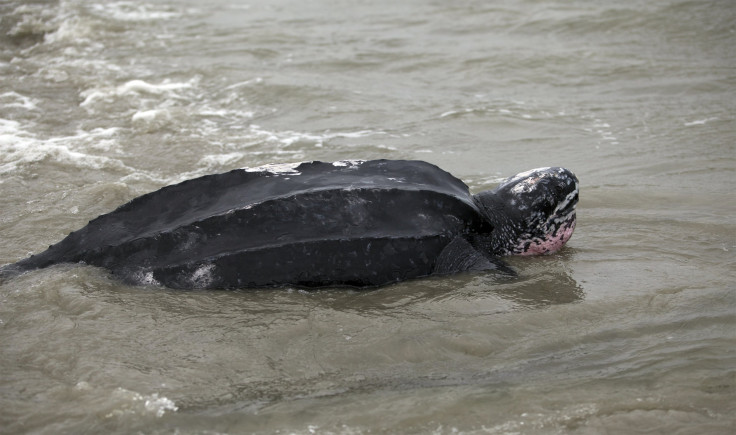100-Year-Old Massive Leatherback Turtle Carcass Washes Up On Shore

A 100-year-old massive leatherback turtle carcass washed up on the shore of Polkerris, near England's village of Par, Cornwall. Two council workers found the carcass, which was completely disfigured.
The turtle, more than 7-foot, was described as "the size of a boat." Leatherback turtles are a rare occurrence in Cornish waters and are categorized by the World Wildlife Fund (WWF) as "critically endangered." The Marine Conservation Society said that less than ten of these majestic animals are spotted in England every year.
James Mustoe, 34, saw the animal when he was on a wildlife watching trip with his children and friend, Richard Pears.
"When we first saw this turtle we really did not know what to make of it...It was the size of a small boat, something Barnaby and Reuben could have both sat on and left room to spare," Pears said.
"While obviously a sad sight, I hope that the information gleaned from our encounter will help people understand more about these magnificent animals and how they come to be in our waters in the future," he added.
Leatherback turtles are known to weigh between 440 pounds and 1,500 pounds. They range from four to six feet in length. They are also said to be the fastest swimmers of all turtle species.
"Encountering this colossal animal in Cornish waters in the way we did seems like a once in a life time occurrence... Its sheer size probably meant it was more than 100 years old, older than all of us on the boat put together," Mustoe added.
Mustoe reportedly contacted Three Bays Wildlife Group expert Robert Wells to report the sighting.
"It was great teamwork. James rang me from Richard's boat and they waited on Polkerris beach to ferry me to the turtle on an inhospitable stretch of shore... They then helped with the photography and measurements before delivering me back to the beach."
"A big thank you to them, we can learn a great deal from stranded marine life. Of the many strandings that I have attended this was both my first turtle and the first that I have been ferried to by boat. Proper job!" Wells added.
According to WWF, leatherback sea turtles are one of the most migratory, crossing both the Atlantic and Pacific Oceans. Pacific leatherbacks migrate from nesting beaches in the Coral Triangle all the way to the California coast to feed on the abundant jellyfish every summer and fall.
© Copyright IBTimes 2024. All rights reserved.




















